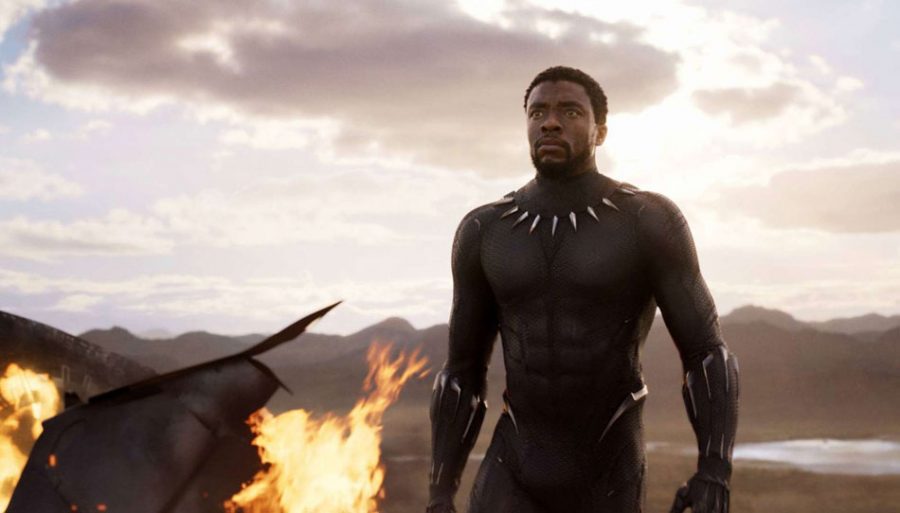Black Panther claws into hearts around the world
Marvel Studios/Walt Disney Studios from Tribune News Service
Black Panther has made over $404 million dollars worldwide in it’s opening weekend.
February 21, 2018
The Marvel Cinematic Universe’s 18th film is its most personal, and perhaps its most important one yet. Starring Chadwick Boseman, Michael B. Jordan, Lupita Nyong’o, Danai Gurira, and many, many more phenomenal actors, Black Panther tells the story of Boseman’s Prince T’Challa as he struggles to come to terms with his father’s death and his rise to the position of king of Wakanda, a fictional African country that has hidden itself and its advanced technology from the rest of the world for centuries.
Black Panther succeeds where so many Marvel and, in some cases, superhero films in general, have failed; everything from the villain and his motivations to the score works in perfect harmony to advance the plot and bring it to its natural conclusion.
Being the untraditional superhero film that it is, the focus of the film is on the characters and it’s message, rather than on all the big budget action sequences that, while are undeniably entertaining, are all too often reduced to CGI smash ups with little to no stakes or real emotion.
Here when there is action, the stakes are clear and present, and the conflict has been established so well that you actually care for and fear for the outcome. In fact, the best fight sequence is not the high-speed car chase sequence or the now-obligatory special effects spectacle that is the end (which is still a feast for the eyes and thoroughly entertaining), but rather the several smaller hand to hand combat scenes where all special powers and suits have been taken out of the equation and it all comes down to skill and prowess of T’Challa and his opponents.
There, with all of Wakanda watching, is where T’Challa grows the most as a character and as a king, as he is forced to deal with challenges to his throne and with the tough decisions that come with his new role as ruler. What he chooses to do in these early scenes effectively sets up who he is throughout the rest of the film and how he deals with the conflict that arises to kickstart the plot.
Speaking of conflict, Michael B. Jordan’s turn as the villainous Erik “Killmonger” Stevens is perhaps the best villain the MCU has seen, and joins the likes of Heath Ledger’s Joker from The Dark Knight in the super villain hall of fame. Though he is the villain, Killmonger steals the show in every scene he’s in, with Jordan’s charismatic performance making his character immediately likeable despite his evil intentions.
And despite how evil his intentions are, Killmonger isn’t necessarily wrong in what he wants. What’s wrong is the way he goes about it. In that sense, he and T’Challa act as perfect foils to one another, as their paths cross and their differing ideologies clash. Both have compelling arguments to be made, what matters is whether or not you agree with their methods.
The only problem with Killmonger is that he isn’t in the film enough, disappearing after his initial appearance and only resurfacing roughly half an hour to 45 minutes later when he makes his grand reappearance and presides over the entire second half of the film. In the time that he’s missing, Andy Serkis’ character, Ulysses Klaue takes over the role of villain, Klaue being a minor character that originally appeared in Avengers: Age Of Ultron to tease Wakanda and the world of Black Panther nearly 3 years ago.
This time, he’s back with his signature sonic arm cannon from the comics to cause even more trouble for T’Challa and Martin Freeman’s agent Ross (originally introduced alongside T’Challa in Captain America: Civil War). Serkis does what he can with his limited screen time, including taking part of the epic car chase and casino fight midway through the movie. Ultimately though, Killmonger is the film’s main villain, and Klaue gets pushed to the side in favor of his far more important role in the plot.
What’s especially refreshing about Black Panther is the fact that it does everything differently from the usual Marvel formula of filmmaking. While Marvel films are well known for their quippy humor, here the jokes are all dialed down, with only a few jokes sprinkled in to great effect and never with the effect of taking away from the gravity of a scene.
Instead, director Ryan Coogler chooses to focus on the the personal impact and message that the film has. Black Panther is the first major superhero film starring a black superhero in the titular role in nearly 2 decades, and it begs the question why more people of color aren’t given starring roles in major studio tentpole films— most of us know the answer to that question (hint: it starts with an “r” and has been a part of our nation’s history from the start), but hopefully, the success of Black Panther will prove to studios that diverse films are capable of success, and oftentimes, end up more successful than less diverse features (case in point, the massively popular Fast and Furious series, which features a largely diverse cast).
In fact, many times, the movie doesn’t even feel like a superhero movie. The second act plays out like a James Bond style thriller, while the third act becomes a high stakes power struggle, akin to a period piece.
Even more importantly, however, is the fact that T’Challa is a figure for young people of color to look up to, as they finally have a hero that looks like them and they can identify and can watch on the big screen.
And the women are not to be forgotten either. Letitia Wright’s Shuri, T’Challa’s genius innovator sister, is an inspiration for all young girls and women hoping to go into various fields of STEM, as she proves that she is the smartest character in the entire MCU, even smarter than the MCU’s resident genius inventor Tony Stark. Danai Gurira and Lupita Nyong’o are equally awesome and inspiring as Okoye and Nakia, members of T’Challa’s all-female bodyguards, the Dora Milaje. They consistently prove they are capable of holding their own in battles, beating up scores of bad guys and stealing every scene they’re in.
What’s perhaps the most important aspect of the film though is its message. The one that is intended for all of its audience. Again, Marvel proves that their best films have strong political undertones (see: Captain America: The Winter Soldier and Captain America: Civil War), and Black Panther may be their most political film to date. It is no mistake that T’Challa, a black superhero, has impenetrable skin, possesses superhuman strength, and is the ruler of a technologically advanced nation in Africa that has never been colonized.
This is what a world without oppression looks like. A world where rampant racism has been isolated from a civilized society, and a just order of equality has been instituted instead. Without having to deal with the constant struggles that have come from the real world’s history of centuries of oppression, Wakanda is able to thrive, and with it, so do its people.
Additionally, Coogler’s use of his hometown of Oakland, California solidifies the fact that this is not isolated phenomenon. Instead, by taking us there, he provides a hopeful glimpse into the future of what a truly equal worldwide society may be.
The only real problem is that after a certain point, the film starts to run out of original ideas. So many visually interesting and exciting things happen, but once they happen, they are repeated several times over the course of the film and almost entirely lose their intended effect. Some repeated scenes feel totally unnecessary, and would have been better off had they been the first scene showcasing the technology, superpowers, or other cool events taking place within the scene. However, the repeated scenes are visually appealing enough to make up for their lack of originality.
Finally, I would be remiss to talk about the film without mentioning the phenomenal soundtrack. The film’s score by Ludwig Goransson is lush and has its own identity, another departure from Marvel’s generic action scores. This time, traditional African drums and vocals accompany the action, distinguishing it as unique while also maintaining a tempo and a rhythm to what is happening on screen.
However, the real star of the show is the Soundtrack Album (Black Panther: The Album) curated by Kendrick Lamar and his label, Top Dawg Entertainment, featuring Lamar and several other artists signed to his label. The songs from the album are all about revealing the inner workings of T’Challa and Killmonger, with the first track, “Black Panther” by Kendrick Lamar, exploring all of T’Challa’s new responsibilities and a later track, “King’s Dead” by Jay Roc, Future, and Lamar, diving into Killmonger’s motivations and psyche.
Meanwhile, other songs such as “Opps” by Vince Staples and Yugen Blakrok and “Pray For Me” by The Weeknd and Lamar pop up during the film, accompanying the soundtrack to create a truly unique sonic landscape for the world of Black Panther.
Black Panther is the first movie of its kind, and is surely not to be the last. Once movie studios realize that audiences don’t merely require constant escapism and being coddled and treated like children with dumb, big budget action with no meaning, they’ll be forced to change their largely cut-and-paste method of filmmaking.
The foundation has been laid for Marvel to continue their efforts in furthering the diversity of the filmmaking landscape with female-led films like Captain Marvel and the long rumored Black Widow movie, and hopefully even more movies starring people of color (starting with a sequel to Black Panther). Black Panther has taken us to the future of the superhero film industry, and there’s no turning back.








